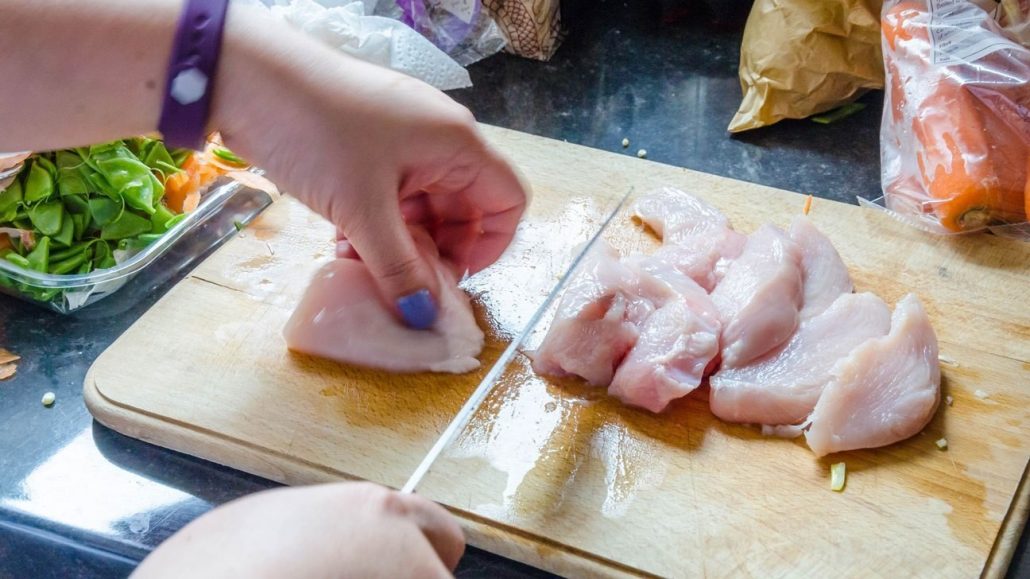Chicken is considered a staple meat in many households. However, this healthy and delicious source of protein has a high risk of bacterial contamination.
That’s why preparing, storing, and cooking it properly is important — otherwise, it could become a source of foodborne illness.
Storing chicken in your fridge is convenient, but many people wonder how long they can safely refrigerate chicken. Let’s take a look at the raw and cooked version and just how long it can safely hang around in your fridge.
How long does chicken last in the fridge?
According to the United States Department of Agriculture (USDA), raw chicken can be kept in your refrigerator for approximately 1 to 2 days. The same applies to raw turkey and other poultry. (1)
Meanwhile, cooked chicken has a little longer shelf life and safely stored in your refrigerator for approximately 3 to 5 days.
Storing chicken in the fridge helps slow bacterial growth, as bacteria tend to grow slower in temperatures below 40°F. (2, 3)
Furthermore, raw chicken is best stored in a leak-proof container to prevent its juices from leaking and contaminating other foods. Cooked chicken should be refrigerated in an airtight container. (4)
If you need to store chicken for longer than a few days, it’s best to store it in your freezer.
Raw chicken pieces can be stored in the freezer for up to 9 months, while a whole chicken can be frozen for up to one year. Cooked chicken can be stored in the freezer safely for 3 to 4 months. (5, 6)
How to tell if chicken has gone bad
If you’ve left chicken in the fridge for more than a few days, there’s a chance it has gone bad.
Below are a few ways to tell if the chicken in your fridge has gone bad:
It’s past the “best by” date: Chicken — raw and cooked — that has passed its “best if used by/before” date is more likely to have gone bad.
Changes in color: Raw and cooked chicken that’s starting to turn a grey-green color has gone bad. Spots of gray-to-green mold indicate bacterial growth.
Smell: Both raw and cooked chicken emit an acidic smell that resembles ammonia as it goes bad. However, this scent can be difficult to notice if the chicken has been marinated with sauces, herbs, or spices.
Texture: Chicken that has a slimy texture has gone bad. Rinsing the chicken will not destroy bacteria. Rather, doing so can spread the bacteria from poultry to other foods, utensils, and surfaces, causing cross-contamination.
If you suspect the chicken in your fridge has gone bad, discard it. (7, 8, 9)
Risks of eating spoiled chicken
Eating spoiled chicken can cause foodborne illness, also known as food poisoning. Chicken has a high risk of causing food poisoning, as it may be contaminated with bacteria. (10)
Some of the most common strains are:
- Salmonella
- Campylobacter
- Staphylococcus aureus
However, you still need to avoid cooking and eating spoiled chicken. Although re-heating or cooking can kill surface bacteria, it won’t eliminate some of the toxins produced by bacteria, which can give you food poisoning if you eat them. (11)
Food poisoning can cause uncomfortable and sometimes dangerous symptoms, including a high fever, chills, nausea, vomiting, diarrhea, bloody stools, and dehydration. (12)
In some cases, severe food poisoning can require hospitalization and even lead to death. Therefore, if you suspect that your chicken is spoiled, do not eat it. It’s always best to discard chicken that you suspect has gone bad. (13, 14)
Bottom Line
Raw chicken lasts in the fridge for 1 to 2 days, while cooked chicken lasts 3 to 5 days.
To detect if chicken has gone bad, check the “best if used by” date and look for signs of spoilage like changes in smell, texture, and color.
Avoid eating spoiled chicken, as it can cause food poisoning — even if you cook it thoroughly.


